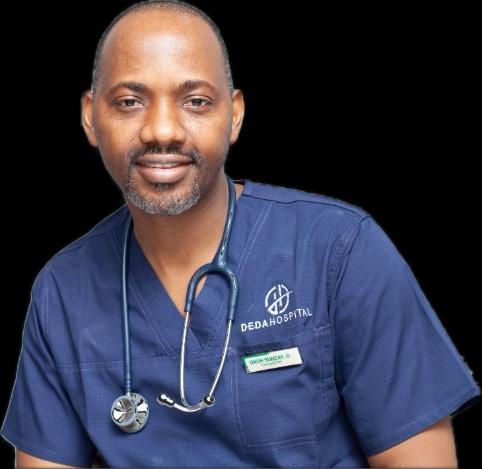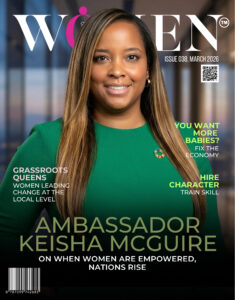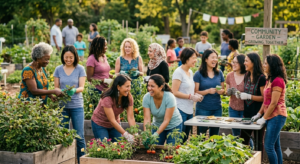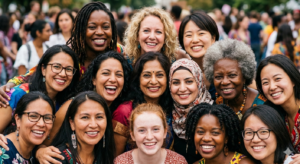Dr Onuh Sunday Omale (MBBS, FWACS, FMCOG, FICS), an esteemed Chief Consultant Obstetrician/Gynaecologist and the visionary Medical Director of Deda Hospital in Abuja, Nigeria. With over two decades of dedicated service in women’s health, Dr Onuh has become an example of excellence, earning the trust and admiration of countless women who have benefited from his exceptional care. He is a Fellow of the West African College of Surgeons and the International College of Surgeons, highlighting his extensive expertise and dedication to his field.
Raising Women Magazine reached out to Dr Onuh for a chat based on the glowing reviews and heartfelt recommendations from women who have experienced his remarkable care. His unique combination of professional excellence and empathetic support makes him a standout figure in women’s health.
Can you tell us what sets DEDA apart seeing that it also comes highly recommended by women who have used your services?
Whenever people ask me that question, I find it difficult to answer because we are simply being true to ourselves. We treat everyone as a unique individual and consider each and every client to be exceptionally special. We do not have VVIPs because, to us, everyone is a VIP. We strive to meet people’s needs by providing personalised care. Our policy and principle is to never compromise on standards while making our services affordable. So, I would say we are just being who we are. Business Highlight
Would you consider your clinic to be among the most affordable, moderately priced, somewhere in between, or the most expensive?
Well, I would not say we are the most affordable, nor are we the most expensive. I believe we fall within the average range in terms of affordability.
What would you say is the most prevalent fertility issue you find among Nigerian women?
Fertility issues are indeed numerous, but one of the most common problems we encounter among women here in Nigeria is tubal blockage, issues with the fallopian tubes. Historically, tubal problems have been the primary concern.
However, these days we have seen a significant increase in ovulatory issues, such as Polycystic Ovarian Syndrome (PCOS). Additionally, conditions like endometriosis and adenomyosis, which were previously less common, are now appearing more frequently in our daily practice. While tubal problems were once the predominant issue, these other conditions are now becoming serious concerns. Would you say there’s a trend of younger people having fertility issues these days? Actually, the answer could be both yes and no. Yes, because people are now seeking help earlier. In the past, individuals waited much longer before consulting a specialist, so we did not often see younger patients as, they felt they had ample time. But nowadays, everyone is more aware. People are trying to address issues promptly, so younger individuals are increasingly attending fertility clinics. This has led to a rise in the number of young people we see with fertility concerns.
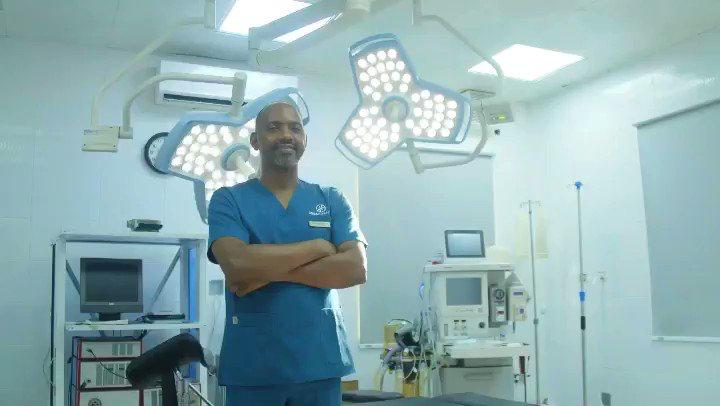
So many young people might say, ‘I’m too young; my eggs are fine; everything should be okay because I’m young.’ But have you encountered situations where an older person has a better chance of fertility than a younger person?
Yes, that does happen. There are times when even young people experience fertility problems that are typically associated with older age groups. For example, we’re seeing an increased incidence of premature ovarian failure these days compared to the past. One reason is that young people are coming in earlier for testing. Previously, they might have stayed at home, assuming that because they are young, they would not have fertility issues, and thus they would not know because they had not been tested. But now, in such situations, you might see someone who is 28 and has a diminished ovarian reserve, compared to someone who is 37 having a better reserve than the 28 year-old. While it is not extremely common, it is more frequent now than before. Perhaps due to environmental factors and lifestyle changes that are more prevalent now compared to previously
Is there anything that a young person can do now to help prevent reaching a point where there is no hope?
Yes, there are steps that young people can take. However, it’s important to acknowledge that some situations are beyond one’s control. For instance, premature ovarian failure is genetically inclined, and unfortunately, there’s nothing you can do to prevent it, it’s just a matter of time. I had a patient who was 28 years old and experienced premature ovarian failure. Luckily, she married at 21 and had two children before this happened. If she had waited, thinking, ‘I’m young and I want to pursue my career,’ it might have been a completely different story in terms of trauma and distress. Even though we are managing her condition now, the pressure is less because she already has children.
But there are other situations where proactive measures can make a significant difference. A lot of people now have Polycystic Ovarian Syndrome (PCOS), which is quite common, about one-third of women of childbearing age have polycystic ovaries, though not all develop the syndrome. The incidence of the syndrome is increasing. Lifestyle changes can help a lot in managing PCOS. Adopting a healthy diet, engaging in regular exercise, and being mindful of what you consume can make a significant impact. PCOS is associated with insulin resistance and a higher risk of diabetes. Some individuals experience weight gain and elevated levels of androgens (male hormones) due to fat conversion. In such cases, weight loss tends to help significantly.
Could you provide advice for older women who are not married and feel the need to take action regarding their fertility before their time runs out?
Yes, precisely. With advancements in technology, we now have what we call fertility preservation. Once you reach that critical age range between 35 and 37, my sincere advice is not to wait until you are 40 to consider fertility preservation. By that point, there’s often not much left to preserve; essentially, you are trying to salvage what you can. So, between the ages of 35 and 37 are critical years when your eggs are still very viable. Additionally, the international duration for preserving eggs has been extended to 10 years post-COVID. It used to be five years.
What role does Nigerian culture play in all of this?
Culture plays a significant role in these matters. In our cultural environment, people often question, ‘What is that person doing?’ or ‘Why isn’t that person married yet?’ There’s a belief that there’s a right time for everything. You don’t just get married because society says so; you have to marry the right person. Our culture tends to view unmarried individuals as unserious or lacking commitment. But you and I know that everything depends on personal choice and what one wants to do with their life. This cultural and societal pressure can sometimes drive people to make decisions they are not truly ready for, leading them to take actions they might later regret medically. For instance, rushing into marriage or delaying important fertility decisions because of societal expectations can have unintended consequences. So, cultural pressures and environmental factors can significantly impact individuals’ choices regarding their reproductive health.
But how does culture affect how people perceive fertility treatments like IVF?
IVF has often been viewed as something artificial or unnatural, with some people believing that those who undergo IVF are trying to ‘play God’, that is a perspective influenced by religious beliefs. However, people sometimes forget that scientific advancements have always faced initial opposition from cultural and religious groups. Eventually, as understanding grows, these innovations become accepted.
Consider the example of airplanes. If we strictly adhered to traditional beliefs, why would we fly or board planes? God did not create planes, but He gave humans the wisdom to invent them. In the past, we had horses and chariots, then cars came along, and now we fly. Does that make us witches or wizards? No, it is simply science and technology at work.
When we talk about IVF, we are dealing with human eggs and sperm. Specifically, a female egg and a male sperm coming together. We are simply bypassing an obstacle that prevents natural conception to help the process along. So, the cultural belief that IVF is unnatural or wrong is actually not correct. I have been working to change that perception, and many people are now openly sharing their IVF experiences, saying, ‘I did IVF.’ If others don’t like it, that’s their concern. This openness is a sign of growing enlightenment.
What about women who cannot afford this or in a situation where they cannot afford to freeze their eggs? What options do they have?
Yes, that is a very precarious situation. What I can say is that there are foundations and charitable organisations that have been established to help in such cases. Periodically, we offer low-cost programmes where we reduce the cost because we have managed to secure supplies to assist those in need. We might lower the costs for a specific period, perhaps once or twice a year.
Additionally, there are government-funded IVF centres available. The Association of Fertility and Reproductive Health in Nigeria, which includes the IVF Society of Nigeria, is working towards making IVF accessible in government hospitals for those who cannot afford private clinics. In fact, we are having a conference next week to discuss this further.
Even so, we know that some people still may not be able to afford treatment, even in government facilities. That is why we are encouraging foundations and advocating for the National Health Insurance Scheme and insurance companies to include fertility treatments like IVF in their coverage. This would help make these services more accessible to those who need them.
What is the average cost of freezing your eggs if a woman wants to do that now? Actually, it depends on the centre, but it is generally comparable to the cost of IVF. Across different centres, the cost ranges between $2,000 to $5,300 USD. Additionally, the annual renewal fee for storage ranges from $200 to $530 USD, depending on the facility.
What is the success rate of Deda in terms of IVF?
Yeah, on the whole, year to year, we’ve been doing between 50% and 60%. So it is not really constant but fluctuating between 50% and 60%.
In terms of your staff, how do you maintain and train them to ensure they uphold ethical standards?
Maintaining high ethical standards requires a significant and continuous effort. We invest heavily in training and retraining our staff regularly. There is an ongoing process of education to reinforce our values and protocols. Additionally, we have systems in place that include both rewards for exemplary conduct and consequences for any breaches. These measures help us uphold our standards and ensure our staff consistently practice ethically.
How do you stay calm and maintain a positive outlook?
It is about taking things in stride and not letting the uncontrollable overwhelm you. There are situations beyond my influence, and worrying excessively about them does not help. I focus on what I can control and accept what I cannot. I pray for favourable outcomes, and for those things beyond my control, I handle them as they come. This mindset helps me stay calm and maintain a positive outlook.
What message do you have for those who are currently on their IVF journey or considering it?
My message is one of hope. As long as there is life, there is hope, regardless of your circumstances or challenges ahead. Be persistent and resilient; stay committed to your journey, and your dream can come true. Do not give up.
Thank you so much Doc, for you great insight.

